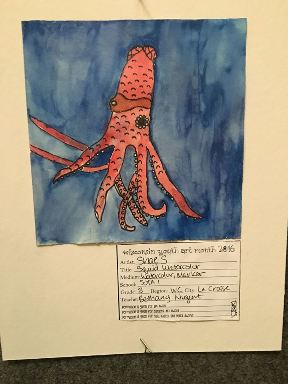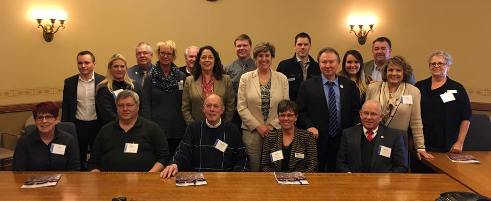Images not loading? View this e-mail in your web browser.

(608)266-5780 | State Capitol, Room 307 West, P.O. Box 8953, Madison, WI 53708 | rep.billings@legis.wi.gov
COMMUNITY EVENTS:
St. Patrick's Day Parade
Saturday, March 12 at 12:00 p.m.
Downtown La Crosse, 2nd and State St.
Victory over Violence Gala
Saturday, March 12
5:30- 9:30 p.m.
LHI Riverside South Center
League of Women Voters Legislative Breakfast
Saturday, March 19
9:30 a.m. - 10:30 a.m.
Days Inn Hotel & Conference Center
CONTACT ME:
State Capitol
Room 307 West
P.O. Box 8953
Madison, WI 53708
Phone:
(608) 266-5780
Toll Free:
(888) 534-0095
rep.billings@legis.wi.gov
Friends and Neighbors,

What a wonderful week to be in La Crosse! With the warmer temperatures, I hope you were all able to enjoy the outdoors this week. In Madison, several groups took advantage of the conditions to spend the afternoon at the State Capitol.
In this week's newsletter, I'll tell you more about meetings with La
Crosse residents, along with important local and national updates.
Best Wishes,

Jill Billings
State Representative
95th Assembly District



Legislative Session: Highs and Lows
With this year's legislative session coming to a close, it is important that legislators reflect on the strengths and weaknesses of enacted policies.
As you may know, Assembly session ended in mid-February, with the
Assembly Speaker announcing that session would not resume again until
next January. I was disappointed that we ended this year's session
without consideration of important legislation to improve our economy,
alleviate student loan debt, and provide for our neighborhood public
schools.
While this session was highly contentious, with a number of bills
harmful to western Wisconsin being signed into law, there was also
important legislation that passed this session.
Here are my highs and lows of the fall legislative session:
High: Introduction of Safe Harbor, and passage of anti-human
trafficking legislation
In many of this year's newsletters I’ve spoken on the importance of Safe
Harbor, anti-human trafficking legislation in Wisconsin. Last year,
Representative LaTonya Johnson and I introduced Wisconsin's Safe Harbor
bill, a bill that would eliminate the definition of "child prostitute."
As children are unable to consent to sexual activity legally, they
should certainly not be charged as prostitutes when forced into
trafficking. The bill would have also provided services for victims of
trafficking.
The bill received a public hearing before the Committee on Children and
Families, and despite overwhelming support on the issue, it
unfortunately did not move forward.
Another bill relating to the crime of child sex trafficking came before
the full Assembly and Senate this session. I, along with Representatives
LaTonya Johnson and Amy Loudenbeck, authored the bill. This legislation
aligned state statutes with the federal "Justice for Victims of
Trafficking Act" by expanding what constitutes the crime of child sex
trafficking, adding child sex trafficking under the definition of abuse
under the children's code, and requiring the reporting, investigation,
and provision of services for children involved in suspected abuse cases
dealing with trafficking.
By passing AB 737, Wisconsin affirmed our commitment to combating child
sex trafficking in our state. However, there is still more to be done --
comprehensive reform including a full Safe Harbor law for victims.
Given the support Safe Harbor received this session, and the needed help
it would provide to victims of human trafficking, I will be introducing
the legislation next session. I am hopeful my legislative colleagues
will continue to stand behind smart reform on trafficking.
Low: Unaccountable Governance
This session, Wisconsin experienced massive blows to our most prized
institutions and resources. While citizens around the state were calling
for improvements to our economy, and to get our state back on track, the
majority's legislators chose to move in the entirely opposite direction.
Not only did they refuse to fix the problems our state faces, they made
a whole host of changes that our Wisconsin neighbors and families never
asked for.
Assembly session concluded on February 18, the earliest session has
ended in 40 years. It is extremely disappointing that majority
leadership would choose to end session so early, especially considering
so many problems were left unsolved.
Worse yet, the 2015-2017 biennial budget as well as a slate of new
legislation this session, hacked away at our state's best resources.
Through the budget and subsequent bills, legislators signed off rolling
back Environmental Protections. In the budget, funding for our
state parks, Department of Natural Resources (DNR) science research and
education positions, our coveted Knowles-Nelson Stewardship program, and
smart transportation alternative programs were cut. In recent bills,
Wisconsin's natural resources -- especially clean water -- were put in
danger through loosening regulations, and removal of DNR oversight on
water management.
Well-managed water levels on our rivers, lakes and streams are vital to
fishing, hunting, boating and other outdoor activities, as well as
quality tourism, commerce and maintained property values. Changes to
environmental regulation are wrong for our state, and surely make the
list of "lows" for this session.
Last year, our state also saw a great deal of cuts to Public
Education and the University System. The UW-System faced a large cut
of $250 million, while public K-12 education continued to struggle, with
no additional resources to make up for previous cuts.
For the first time in history, Wisconsin's per-pupil spending fell below
national levels. The impacts to both University and public education
included larger class sizes, decreasing teaching staff, and a lack of
available resources to students.
The impact to the University System is discussed later in this article.
Education should naturally be our state's priority -- seeing as it
shapes the success of future generations. However, in another low for
this legislative session, Republicans significantly devalued Wisconsin
education.
For the many of us who've traveled down Wisconsin roads, highways and
bridges, it's safe to say our state's Transportation is in need
of serious work. With a majority in the legislature, Republicans could
have passed any sort of transportation plan they wanted. However, with
over a year in time, they failed to produce a plan to address
transportation funding.
Transportation funding has been left on the state's credit card, and
Republican legislators have kicked the can down the road for another
session, leaving Wisconsin's state of transportation exceptionally
bleak.
There were many "lows" this session -- including the issues above,
regressive policies towards women, restrictions on voting rights,
further restrictions on workers' rights through so-called 'right to
work' laws, and more -- showing that overall, this session was a failure
for Wisconsinites.
We had ample opportunity to better the state for our constituents, and yet the
majority party allowed political gamesmanship and regressive
policymaking to stand in the way.
UW-La Crosse to Cut Positions to Make up for Budget Losses
2015-2017 budget cuts had almost immediate effects on our public schools, universities and public service agencies. The UW-System, the largest economic driver in the state, suffered a $250 million cut, which has in turn caused universities in Wisconsin to cut course offerings, increase class sizes, and let go of valuable teaching staff.
Last fall, UW-La Crosse faced a $1 million shortfall, forcing them to
freeze 14 instructional positions. This year, given declining enrollment
figures, UW-L will have to face another budget shortfall of $600,000.
University officials say that teaching positions will likely be cut to
make up for the shortfall, meaning our dedicated faculty and students
will lose out due to poor funding decisions.
Read the full article on this issue from the La Crosse Tribune here.
International Women's Day

Did you know that Tuesday, March 8 was International Women's Day? International Women's Day is a day meant to recognize the important economic, social, cultural and political achievements of women around the world. While women have made significant strides towards equality around the world, there is still progress to be made.
The World Economic Forum predicted last year that it the gender gap
wouldn’t close entirely until 2133.
To address this issue, this year's theme was #PledgeforParity,
encouraging individuals to sign a pledge to help women and girls achieve
their ambitions, challenge conscious and unconscious bias, call for
gender-balanced leadership, value women's and men's contributions
equally, and create inclusive and flexible cultures.
The pledge aims to take a concrete step towards achieving gender parity.
Click here to sign the pledge.
Youth Art Month
It's Youth Art Month in the State Capitol! Artworks from students around the state are on display in the Capitol rotunda during the month of March.
There are so many great pieces here by exceptionally-talented La Crosse
students. Here are just a few of the pieces on display this month:



